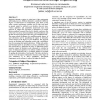Free Online Productivity Tools
i2Speak
i2Symbol
i2OCR
iTex2Img
iWeb2Print
iWeb2Shot
i2Type
iPdf2Split
iPdf2Merge
i2Bopomofo
i2Arabic
i2Style
i2Image
i2PDF
iLatex2Rtf
Sci2ools
114
click to vote
SIGSOFT
2004
ACM
2004
ACM
Reasoning about partial goal satisfaction for requirements and design engineering
Exploring alternative options is at the heart of the requirements and design processes. Different alternatives contribute to different degrees of achievement of non-functional goals about system safety, security, performance, usability, and so forth. Such goals in general cannot be satisfied in an absolute, clear-cut sense. Various qualitative and quantitative frameworks have been proposed to support the assessment of alternatives for design decision making. In general they lead to limited conclusions due to the lack of accuracy and measurability of goal formulations and the lack of impact propagation rules along goal contribution links. The paper presents techniques for specifying partial degrees of goal satisfaction and for quantifying the impact of alternative system designs on the degree of goal satisfaction. The approach consists in enriching goal refinement models with a probabilistic layer for reasoning about partial satisfaction. Within such models, non-functional goals are sp...
Alternative Goal Refinements | Goal Refinement Models | Goal Satisfaction | SIGSOFT 2004 | Software Engineering |
Related Content
| Added | 20 Nov 2009 |
| Updated | 20 Nov 2009 |
| Type | Conference |
| Year | 2004 |
| Where | SIGSOFT |
| Authors | Emmanuel Letier, Axel van Lamsweerde |
Comments (0)

